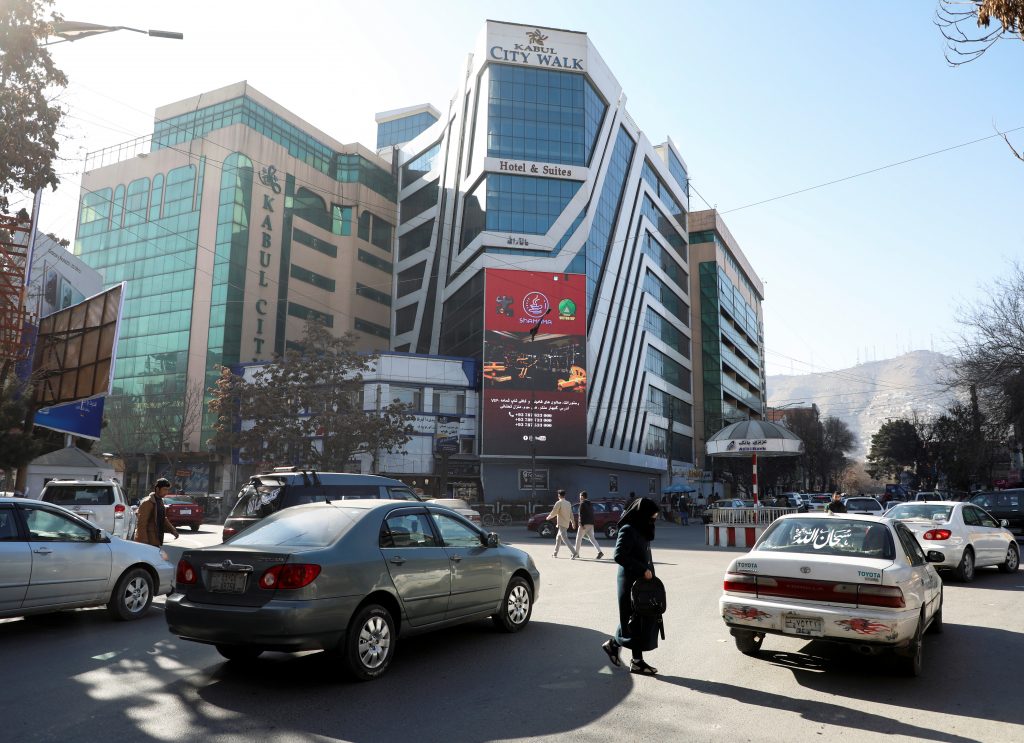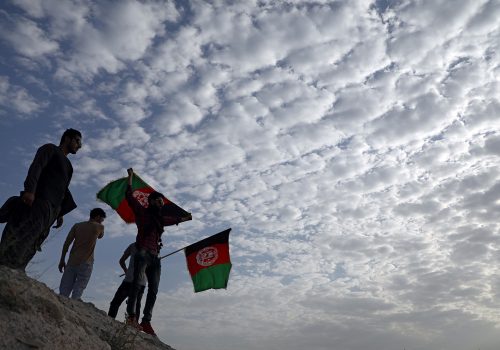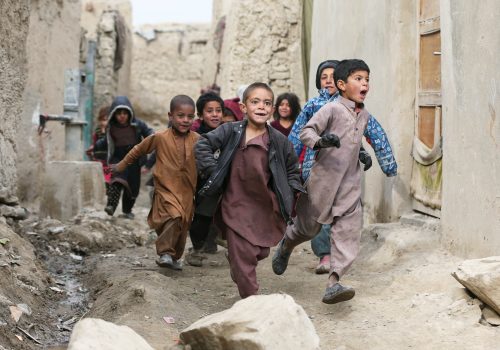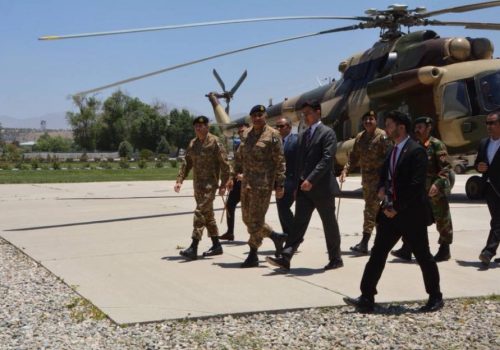After briefly resuming on January 5, the intra-Afghan peace talks between the Afghan government and the Taliban have been slow to progress, and the two sides have not met since the Biden administration announced that they would review the February 2020 US-Taliban peace agreement. While the Afghan government’s team awaits the resumption of talks in Doha, Taliban leaders have been travelling throughout the region, meeting with leaders in Iran, Russia, and Pakistan lobbying and courting support.
Since the signing of the February 2020 agreement led by the Trump administration, the deal has been viewed as significantly flawed by many across the Atlantic, not least because it excludes the Afghan government, women, and civil society. Over the past year, many experts in Afghanistan and the international community have increasingly viewed the deal to be largely skewed to advantage the Taliban. The Biden administration’s step to review the agreement has thus been welcomed by many.
While all await the result of the review and expect a new direction from the Biden administration, what do Afghans expect to see and what do they want to change? In this blog, five Afghans who have lived under the increased threats and violence of the past year share their perspectives.
Mir Aqa Popal, News Manager, Tolonews
What are your thoughts on the Doha peace process and what do you want to see change?
The Doha process is losing momentum among the Afghan people, politicians, and the countries involved. The agreement is one-sided, does not include the interests of the majority of the Afghan people, and will need careful assessment to revise. Since the signing of the agreement, violence has increased which has added to the frustration of the Afghan people, and people are increasingly losing hope in this process as violence grips the country. As a news manager, I have estimated that between February 1 and 15, in just a few major cities (Kabul, Jalalabad, Kandahar, Mazar-e-Sharif, Lashkargah), some 340 people have been injured and at least 132 were killed in explosions and targeted assassinations. Given the rising level of violence and insecurity, past failed experiences, and the lack of willingness from all parties involved, it is hard to imagine that this process will succeed in the near future.
What are your expectations of the Biden administration’s review of the US-Taliban agreement?
As a journalist, I expect that the new US administration will firmly assess the commitments of the Taliban and hold the group accountable. It is critical to look into whether the Taliban fulfilled their commitments on cutting ties with international terrorist groups like Al-Qaeda and its affiliates, reduced violence, and meaningfully engaged in the peace talks to discuss a ceasefire. People need to see the impact of the peace talks in their lives in order to believe in this process. Many of us no longer feel safe in the workplace or even our homes. My office is only about three miles away from my house and despite the short distance, every day after I leave home, my parents and siblings call me individually to see if I arrived safely to work. The fear among the people is very real, and for that to change, there has to be a major shift in the attitudes of those who terrorize us and then sit at the peace table.
What do you think is the way forward regarding the current crisis in Afghanistan?
The current crisis in Afghanistan does not have a military solution. The experience of the past 20 years have demonstrated that the way forward has to be via a political solution but the Taliban should know that they cannot return to power and expect to rule like they did prior to 2001. The Afghan people have changed over the last 20 years, and they do not want to return to the dark days. Any agreement that does not guarantee the current political system of a republic, human rights and women’s rights, and freedom of expression and of the press, will not result in a sustainable peace in Afghanistan.
How do you see the process unfolding?
Given recent developments in the process, in particular the review of the agreement, it is hard to believe that there will be significant progress towards peace in the near future. The process is delayed and there is a complete deadlock in the Intra-Afghan talks. It does not look like peace will prevail in the near future.
Najiba Ayubi, Director General of DHSA, Killid Group Radio
What are your thoughts on the Doha peace process and what do you want to see change?
The Doha agreement had major issues from the beginning, and one significant point was that the Americans could only convince the Taliban to not attack them as part of the deal. For years, Afghans have continuously sacrificed, lost their lives, and still live in the most difficult of circumstances. We must also note that Afghan sacrifices have not just been for their own war – this is not an Afghan war alone. The Afghan people are paying a hefty price for a regional war, a war of competition, and a war that they have little stake in but have one in which their losses have been enormous. The United States should use any available leverage to pressure the Taliban to commit to a ceasefire and to stop killing Afghans. There is still an opportunity to do right by its ally and change course.
Of the four terms included in the agreement, the Taliban have failed to observe at least two. The level of violence has increased and they have not severed ties with other terrorist groups. The lack of an observing mechanism to determine whether promises were fulfilled has also been a huge problem.
What are your expectations of the Biden administration’s review of the US-Taliban agreement?
It is a good opportunity to review Taliban behavior over the past year and assess whether they fulfilled their promises. In the last 12 months at least, we have seen a huge uptick in levels of violence in the country – civilians, professors, judges, journalists, members of civil society and anyone who speaks up is targeted. This spree of killings is in contrast to the existing agreement and peace talks for the past year. The review needs to include a careful analysis of the text of the agreement. The term “Islamic government” in the agreement is another opportunity given to the Taliban to interpret the terms in their favor as it allows them to determine the terms as the Islamic Emirate or Islamic state. The review should not allow for different interpretations.
What do you think is the way forward regarding the current crisis in Afghanistan?
The conflict in Afghanistan is more than forty years old and is at its worst point in memory. There is a general consensus that the only solution is a political one – one that preserves the republic but changes its operatives and those who lead it. This republican system of government must be independent, accountable to the people, work for the people, and be free of corruption. Additionally, the gains of the past 20 years in infrastructure, human rights, women’s rights, free press, and civil liberties must be preserved, promoted, and strengthened. Importantly, the existing democracy needs to be protected because without democracy and democratic values, the current crisis will intensify and the resulting violence will worsen substantially. Without a democratic system, no government will be sustainable because citizens need to feel represented and have the power to participate and ask for accountability.
How do you see the process unfolding?
The reviewing of the agreement has given hope to the Afghan people – a hope that the Taliban’s violent actions will be assessed, that there will be some control over the level of violence, and that there will be a monitoring mechanism to further review violations of the terms of the agreement.
The latest open Taliban letter to the United States indicated apprehension among the group about the result of the review. The Taliban’s trips to Iran, Pakistan, and Moscow also show that they have been lobbying regional players and demonstrates their lack of concern and respect for the Afghan people, who they have not consulted. This review, I hope, will lead to an understanding among the Taliban that their actions have consequences and that after all, they are not sole actors in this process. It is time to shift the dynamics and work towards a process that can lead to real and durable peace.
Obaid Ali, Senior Researcher and Political Analyst, Afghanistan Analysts Network
What are your thoughts on the Doha peace process and what do you want to see change?
The expectation is that with the review, parts of the agreement will be adjusted and that it will be more balanced. The review should particularly put pressure on the Taliban to observe their commitments on the reduction of violence. It is critically important to define the “reduction of violence.” I also expect the review to make both sides of the conflict accountable for killing and arming civilians and should enforce a regulation for the protection of civilians in all areas of control.
What we have seen so far is that the Taliban demands based on the Doha agreement were somehow implemented. The release of 5,000 Taliban prisoners, reduction or ceasing of the night raids, airstrikes, and targeted killing of local Taliban officials are the examples of demands that have been fulfilled by the Afghan government as well as US and NATO forces. From the Taliban side, there have been many fewer obligations fulfilled. For example, there have been ongoing attacks against the Afghan security forces, bombing of the Afghan government’s security forces headquarters (Ghazni/Wardak), and increased targeted killings of security and civil servants of the government. These violations need to be assessed and the hope is that there would be more accountability for these and other violations.
What are your expectations of the Biden administration’s review of the US-Taliban agreement?
The Doha agreement was crafted and reached in the absence of the Afghan government and behind closed doors. The issues reflected in the agreement are more or less based on favoring the Taliban which has weakened the Afghan government’s legitimacy. Because of this shift in the power dynamic, the Taliban prefers to speak and negotiate with US officials and bypass the Afghan government. There were also several meetings between US officials and Afghan political players. Many of these political players had and have been involved in corruption and many of them (if not all) have bad reputations. In fact, such steps and decisions to include corrupt leaders have strengthened the Taliban and those political players’ positions. Such steps further put into question the government’s legitimacy which weakens it in the political and military arenas.
In the review, the hope is that the new administration will look beyond the political players and will amplify voices not only from specific groups involved so far, but also those of the Afghan people. While the review is underway, and the Americans look for options, I do not think that the formula of an interim government would help to bring sustainable peace and security. Rejecting this idea for an interim government goes beyond the failed attempt and experience of the 1990s. An interim government is not a viable solution because there is no pathway to changing the leadership. It only offers a platform for the very same leaders to resume positions of power post-interim government.
What do you think is the way forward in the current crisis in Afghanistan?
There is much to do. I think one main thing that would help to put an end to the current crisis is to reform the leadership in the country, especially those who claim to have earned the status of a leader. The very same people have been in charge in one form or another, leading the country for over three decades. Some of these individuals have been involved in corruption and violations of human rights to say the least, and have proven to be incapable of leading Afghanistan forward.
How do you see the process unfolding?
This process needs time and patience because the Afghan war is complicated. I do not think that the process will make positive changes in the long-term if it is rushed and forced to a short-term result. Lastly, this process will only succeed if the two main parties, the Afghan government and the Taliban, as well as all other parties participating, have the national interests and security of Afghanistan, the region, and the world in mind. Unfortunately, that seems to be a challenge for now.
Shireen Shahabi, Resident, Kabul
What are your thoughts on the Doha peace process and what do you want to see change?
The Doha agreement is in favor of the Taliban. The group benefited from the agreement and have gotten away with not fulfilling their commitments. With the review, I hope to see two things change: firstly, that there is a mechanism that can implement the terms of the agreement and secondly, if the Taliban continue to fail in delivering on their commitments under the deal, that there are more restrictions and sanctions imposed on the group. The Taliban’s last wish is for the United States to withdraw and that should only happen conditionally with a monitoring mechanism in place.
What are your expectations of the Biden administration’s review of the US-Taliban agreement?
Over the last year, violence has increased. The Afghan government released more than 5,000 Taliban prisoners, most of whom we now know returned to the battlefield. The Taliban also continues to collaborate with other terrorist groups that they promised to cut ties with. All of this must be considered during the review and this process.
What do you think is the way forward in the current crisis in Afghanistan?
It is the people’s wish that the negotiations continue. Peace talks are important, but we must protect the republican system of governance. It is the only way that further crises can be prevented because it is the only way to ensure that people are represented and have a voice. Without genuine agreement and consensus on the future of the republic, the peace talks will lead to more chaos. To prevent this, there should be a clear roadmap that represents this major and critically important wish of the people.
How do you see the process unfolding?
In order for this peace process to succeed, the Afghan government, the Taliban, regional countries, and international stakeholders must have a shared goal of reaching peace. If there is no shared vision and no united position and around which all these actors can make logical and long-term strategic decisions, the future of Afghanistan remains bleak. As we experience and learn daily, the impact of these bad decisions will not only harm Afghans and Afghanistan but will also reach many beyond its borders. Regional countries as well as Europe and the United States, and even China and Russia, will be impacted too. It will take far and near actors to support the process and agree on a single roadmap for a democratic republic in Afghanistan. Supporting a system that includes electing leaders is critical in preventing another war in Afghanistan because power sharing is not the solution. It will open another chapter of conflicts which will be difficult to manage.
Sayed Mohammad Baqir Kazemi, Lecturer, Dunya University
What are your thoughts on the Doha peace process and what do you want to see change?
One of the main wishes of the people of Afghanistan from the Doha process is peace and the restoring and strengthening of security in the country. The Taliban, despite their obligations under the agreement with the United States, have not worked towards peace. Instead, they employed a new tactic of killing and targeted assassinations which have been happening every day for the past year. Although the group does not take responsibility, the evidence and reports suggest that it is either the Taliban or their affiliates who are behind these attacks.
If the Taliban really want peace, they should listen to the people of Afghanistan and reduce and stop their violence against the people. The people of Afghanistan want peace and an end to the killings. Without it, it is impossible to imagine a real peace.
What are your expectations of the Biden administration’s review of the US-Taliban agreement?
The hope is that the review will reveal the true level of violence we are experiencing in Afghanistan and that the Taliban will commit to genuine talks with the Afghan government delegation. With the review, the Afghan people hope that the new administration will do a comprehensive analysis of the agreement and will not allow Afghanistan to once again become a safe haven for the terrorist groups. The major hope from the review is also that the United States will demonstrate its leadership to the world, show that they will not condone this level of violence and terrorism, and make clear that they will not allow terrorist groups to have the upper hand and destabilize the world order.
What do you think is the way forward in the current crisis in Afghanistan?
The Afghan people, especially politicians, need to leave their personal interests behind and unite for peace in Afghanistan. Importantly, the United States, NATO, and the region must work together in using any pressure available against terrorist groups. They must impose sanctions on the terrorist groups and add their names to blacklists. They have leverage, and they must use it now when it is most needed.
How do you see the process unfolding?
The Afghan conflict is multifaceted and decades of war have made it even more complex. It has many parties, deeming it not just an Afghan war. The many years of conflict and many parties and varying interests make it hugely challenging to resolve and more prone to becoming messy. In the Doha peace process, the Taliban are trying to take advantage of the crisis, the regional players and others are trying to use their influence to benefit themselves, all while the Afghan people continue to live with the consequences. It is the Afghans who live in poverty, fear, and death. Afghans deserve a chance to live in peace.
Makhfi Azizi is the director of the Campaign for Afghan Women and Girls at the Feminist Majority Foundation as well as a guest editor and an expert adviser on the Atlantic Council’s Strategic Dialogues on Afghanistan.

The South Asia Center is the hub for the Atlantic Council’s analysis of the political, social, geographical, and cultural diversity of the region. At the intersection of South Asia and its geopolitics, SAC cultivates dialogue to shape policy and forge ties between the region and the global community.
Related content
Image: A youth walks at a street in Kabul, Afghanistan February 4, 2021. REUTERS/Omar Sobhani



